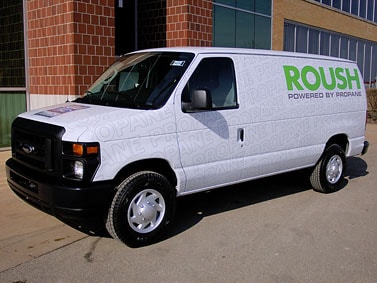American builder Roush announced today its new line of propane-fueled E-Series vans has received the Environmental Protection Agency approval, as they were found to meet the Federal emission regulatory requirements.
The approval covers 2010 model year Ford E-150, E-250, and E-350 cargo vans, wagons, and certain cutaway configurations with a GVWR of up to 10,000 pounds, all using the 5.4L, 2V V8 engine.
In addition to the EPA approval, Roush also has pending California Air Resources Board (CARB) certification requests. EPA is yet to have its say on some other propane-powered vehicles from Roush's lineup as well.
The vans, which are available for order as of now, are eligible for a variety of federal, state, and municipal tax credits or rebates. In some cases,QAFMV tax credit can cover 80 percent of the incremental cost to convert certain models.
A propane powered vehicle can provide up to 20 percent less nitrogen oxide, up to 60 percent less carbon monoxide, 24 percent fewer greenhouse gas emissions, and fewer particulate emissions when compared to gasoline.
According to Roush, use of the propane system will allow, in some cases, for fleet managers to save some $17,500 per van over a total vehicle life of 150,000 miles in terms of fuel. All the tweaked vans will be covered by a 3-year/36,000 mile warranty.
"The response from the fleets to our line of F-150, F-250 and F-350 propane pickups and conversion kits has been outstanding, and their feedback inspired us to develop the complete line of E-Series vans," Jack Roush says.
The approval covers 2010 model year Ford E-150, E-250, and E-350 cargo vans, wagons, and certain cutaway configurations with a GVWR of up to 10,000 pounds, all using the 5.4L, 2V V8 engine.
In addition to the EPA approval, Roush also has pending California Air Resources Board (CARB) certification requests. EPA is yet to have its say on some other propane-powered vehicles from Roush's lineup as well.
The vans, which are available for order as of now, are eligible for a variety of federal, state, and municipal tax credits or rebates. In some cases,QAFMV tax credit can cover 80 percent of the incremental cost to convert certain models.
A propane powered vehicle can provide up to 20 percent less nitrogen oxide, up to 60 percent less carbon monoxide, 24 percent fewer greenhouse gas emissions, and fewer particulate emissions when compared to gasoline.
According to Roush, use of the propane system will allow, in some cases, for fleet managers to save some $17,500 per van over a total vehicle life of 150,000 miles in terms of fuel. All the tweaked vans will be covered by a 3-year/36,000 mile warranty.
"The response from the fleets to our line of F-150, F-250 and F-350 propane pickups and conversion kits has been outstanding, and their feedback inspired us to develop the complete line of E-Series vans," Jack Roush says.

